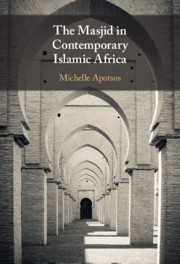Book contents
- The Masjid in Contemporary Islamic Africa
- The Masjid in Contemporary Islamic Africa
- Copyright page
- Dedication
- Contents
- Figures
- Preface
- Acknowledgments
- Introduction
- 1 Spaces Both Radical and Revolutionary: The Intersectional Masjid
- 2 Monument, Memory, and Remembrance: Rethinking the Masjid Through Contemporary Heritage Regimes
- 3 “All the Earth Is a Mosque”: The Masjid as Environmental Advocate
- 4 Masjids on the Move: Mobility and the Growth of “Portable” Islamic Space
- Conclusion
- Bibliography
- Index
2 - Monument, Memory, and Remembrance: Rethinking the Masjid Through Contemporary Heritage Regimes
Published online by Cambridge University Press: 05 August 2021
- The Masjid in Contemporary Islamic Africa
- The Masjid in Contemporary Islamic Africa
- Copyright page
- Dedication
- Contents
- Figures
- Preface
- Acknowledgments
- Introduction
- 1 Spaces Both Radical and Revolutionary: The Intersectional Masjid
- 2 Monument, Memory, and Remembrance: Rethinking the Masjid Through Contemporary Heritage Regimes
- 3 “All the Earth Is a Mosque”: The Masjid as Environmental Advocate
- 4 Masjids on the Move: Mobility and the Growth of “Portable” Islamic Space
- Conclusion
- Bibliography
- Index
Summary
The second chapter addresses three case studies that position masjids as spaces that reflect processes of compromise, concession, and sometimes intervention as it concerns heritage. The first case study explores how the shrine and mosque structures of the holy city of Harar Jugol (Ethiopia) serve as both spiritual touchstones and important Islamic heritage sites, and, in doing so, reflect the problems involved in how these sites negotiate these dual realities. The second case study focuses on the Muslim community of New Gourna, designed by Egyptian architect Hassan Fathy, which was meant to function both as a sustainable community and as a celebration of Egypt’s architectural, cultural, and spiritual legacies, but ultimately failed. Interestingly, Fathy would transplant these ideas in a later masjid project located in Abiquiú, New Mexico, raising questions about the so-called “embeddedness” of heritage traditions. The third case study also references this aspect with regards to contemporary spiritual architectural imports like “Neo-Ottoman”-style mosques into African space. This was recently realized in Ghana’s new National Mosque, located in the capital city of Accra, which eschews Ghana’s historical mosque-building traditions and raises questions with regards to who the stakeholders are in decisions about what constitutes heritage and what does not.
- Type
- Chapter
- Information
- The Masjid in Contemporary Islamic Africa , pp. 79 - 131Publisher: Cambridge University PressPrint publication year: 2021



